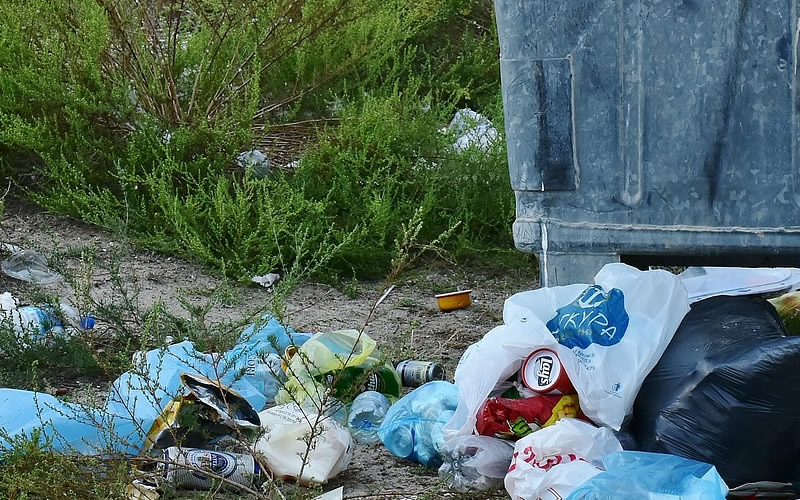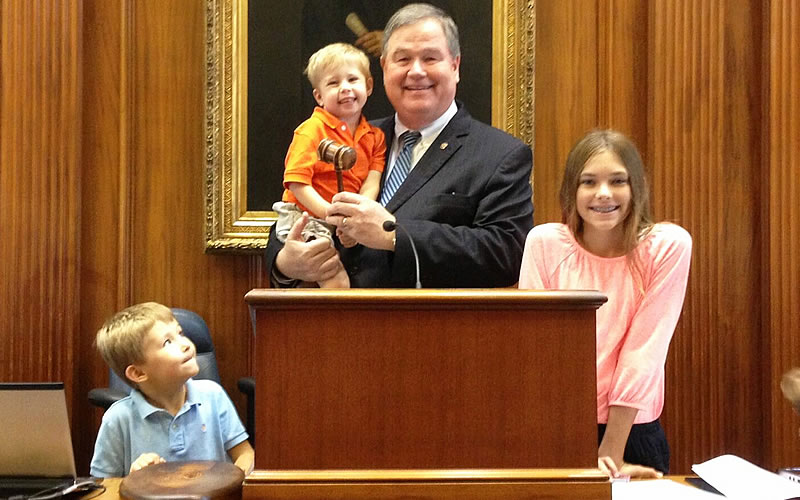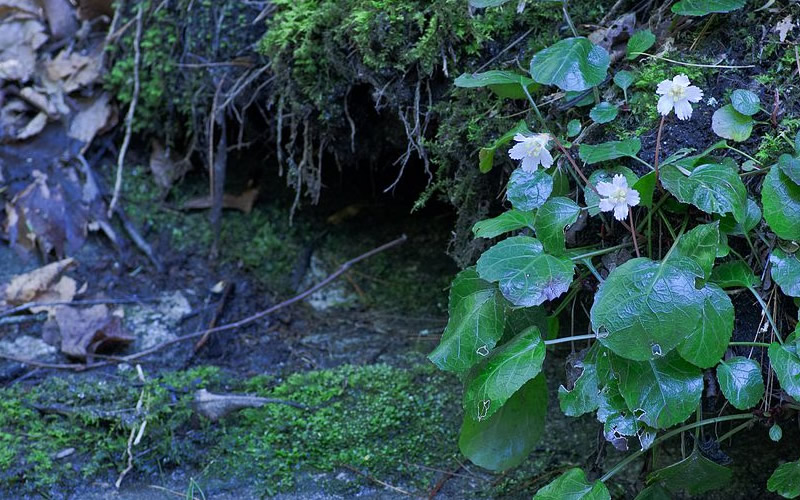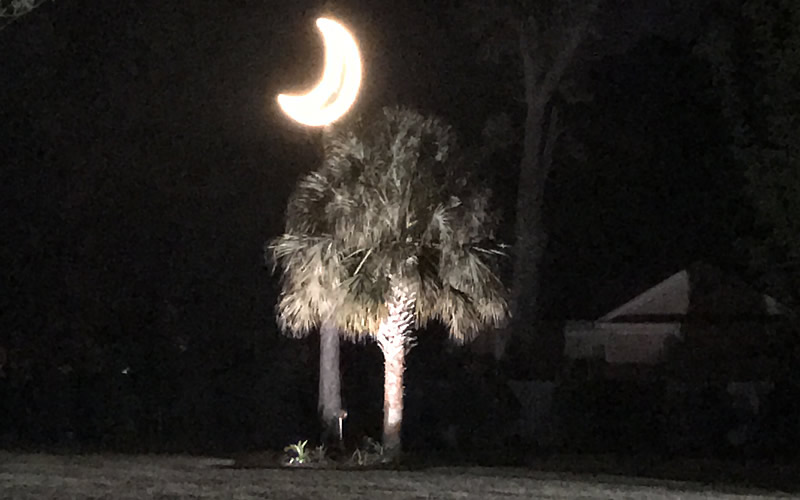NEWS: Senate may decide on bagging plastic bag bans
BRIEFS: South Carolinians focused on education, roads, poll says
CALENDAR: Children’s advocate bill is on House floor
COMMENTARY, Brack: Will the Year of the Woman impact S.C. governor’s race?
SPOTLIGHT: S.C. Independent Colleges and Universities, Inc.
MY TURN, McGill: South Carolina is worth fighting for
FEEDBACK: Confessions of a C-SPAN junkie
MYSTERY PHOTO: Looks like someone really likes South Carolina
S.C. ENCYCLOPEDIA: Oconee bells
NEWSNEWS: Senate may decide on bagging plastic bag bans

By Lindsay Street, Statehouse correspondent | A bill to ban plastic bag bans that is designed to protect big business is an egregious example of state government overreach into local affairs, opponents say.
Earlier this month, the S.C. House of Representatives passed a bill 73-41 that preemptively disallows local governments from enacting bans on single-use plastic bags and other plastic items. Wags jokingly refer to the measure as the “plastic bag-ban ban.”
The House bill comes as coastal communities in the state have been adopting such bans since 2015. This week, House bill H. 3529 received a Senate committee’s blessing to make it to the floor for debate. But it’s unclear if there will be enough time for the bill to come up this year. Because it’s on the Senate’s contested calendar, there are a lot of bills that take precedence. However, supporters have two options, both of which have occurred this year: Either vote to take up the bill as a special order or invoke a special one-day rule that could force the debate.
Issue of government autonomy at local level
S.C. Rep. Micah Caskey, R-Lexington, was one of the few non-coastal Republicans in the House to vote against the House bill. While he doubted the reasons behind local municipalities passing plastic bag bans, he said it should ultimately be up to those governments to decide.

“I see the question as a matter of local government autonomy,” Caskey said. “If we do not allow local governments to make a decision about this then why do we even have local governments?”
Supporters for the bill have said it will increase the cost of doing business if municipalities or counties are allowed to ban certain containers.
According to the National Conference of State Legislatures, 10 states have enacted legislation preempting local governments from imposing a ban or fee on plastic bags: Arizona, Florida, Idaho, Indiana, Iowa, Michigan, Minnesota, Mississippi, Missouri and Wisconsin. There is also a bill pending in Ohio.
State governments typically take preemptive action on traffic enforcement, according to Tiger Wells, government affairs liaison for the Municipal Association of South Carolina. He said that helps people traveling between cities “to know the laws of however many municipalities or counties you pass through.”
An example of this is the state ban on texting while driving. Several municipalities had enacted their own ordinances banning the practice before the state enacted its own statewide ban. Preempting other local ordinances is infringing on local governments’ authority, which is why the Municipal Association has been lobbying against the statewide bag ban effort, Wells said.
However, there is precedent for state preemptive action beyond traffic enforcement in South Carolina. Wells said there have been bans on “new local taxes” and “strict limitations on the ability to raise existing millage rates on the local level.” He said both examples have made it difficult for local governments to provide services to residents.
Opponents point to home rule
The latest preemptive bill has an environmental component — preventing communities from banning plastic bags, which can litter waterways and endanger wildlife. But its opponents are laser-focused on the issue of home rule.

“H. 3529 is an example of state government overreach. If passed, this bill would prevent cities and towns from making important, local decisions — such as how to address plastic pollution,” said Rebecca Haynes, deputy director of the Conservation Voters of South Carolina. “Local communities should have the ability to make independent decisions at the local level to reflect the needs and desires of their residents without interference from state government.”
Mount Pleasant is the latest S.C. municipality to enact a ban on single-use plastic containers. But if the House bill passes in its current form, the town would not be able to keep its ban, despite a grandfather clause. That clause is only for local governments that passed the ban prior to Jan. 31, 2018.
“It’s sad to see our South Carolina government do exactly what they despise the federal government for doing,” Mount Pleasant Mayor Will Haynie said in a statement to Statehouse Report. “Support of the principle of home rule in South Carolina is similar to support of First Amendment rights — it’s not for just when they agree. In fact, it is to protect local governments from state overreach in situations exactly like this. Coastal municipalities have unique issues and responsibilities. The legislature should respect that.”
This week, another town, Hardeeville, is also considering a ban.
More than a coastal issue
While banning plastic bags has mostly been enacted in coastal communities, Wells said the issue reaches beyond “just a coastal issue.”
“(This is) their fundamental right and authority to address these kinds of local issues,” Wells said. “Taking away that right or curtailing that authority in a very real way is something that’s alarming to us as an association that represents municipalities.”
Novolex, which operates a plastic plant in Hartsville, has been lobbying for the measure, according to Wells. Novolex did not respond to a request for comment, and neither did S.C. Sen. Gerald Malloy, D-Darlington, who represents Hartsville. According to The State, the American Progressive Bag Alliance has opposed plastic-bag bans and spent $30,500 lobbying S.C. lawmakers in 2017. The Alliance also did not respond to a request for comment.
In a poll released this week by Winthrop, 60 percent of respondents said stricter environmental laws and regulations are worth the cost.
- Have a comment? Send to: feedback@statehousereport.com
BRIEFS
BRIEFS: South Carolinians focused on education, roads, poll says
![]() By Lindsay Street, Statehouse correspondent | Education, roads and jobs top the list of issues for South Carolina residents, according to the results of a Winthrop Poll released this week. Respondents said the top problem facing the nation is immigration. Here are a few other tidbits from the poll:
By Lindsay Street, Statehouse correspondent | Education, roads and jobs top the list of issues for South Carolina residents, according to the results of a Winthrop Poll released this week. Respondents said the top problem facing the nation is immigration. Here are a few other tidbits from the poll:
- 67 percent of respondents said the state’s economy is either very or fairly good, and nearly 59 percent described their own financial situation as good or excellent.
- South Carolinians remain dubious of Congress’ effectiveness. Only 14 percent said they approve of the job Congress is doing. The state’s legislature received a 44 percent approval rating.
- Gov. Henry McMaster received a 46 percent approval rating, but 19 percent of respondents said they were not sure about him.
- While 90 percent of respondents said they believe in a higher power, 60 percent said homosexuality should be accepted by society. About 44 percent say churches are too involved in politics, and 60 percent said humans have evolved over time.
Here are some more items that happened this week:
Senate cuts rates. The Senate voted to reduce rates for South Carolina Electric & Gas customers by 13 percent. Ratepayers have been paying extra to help pay for defunct nuclear project in Jenkinsville. The House, which wants a bigger cut, and the Senate need to agree on the bills now passed in both chambers. Read more here.
Coastal development. Both chambers have now passed a bill that abandons the state’s 30-year-old policy of retreat on the shores when it comes to development. McMaster has expressed support for the bill. Read more here.
Deadly melee. State lawmakers say they want to tour the Bishopville maximum-security prison to see conditions following a Sunday night melee that left seven inmates dead and more than 20 injured. Meanwhile, the former head of the prison system in Texas will lead an independent team to figure out what happened at the prison, following a request for outside review by the state Department of Corrections.
Corruption. Statehouse corruption special prosecutor David Pascoe confirmed this week that he has hired a former federal prosecutor and Columbia defense attorney who specializes in white collar crime. More.
Stepping down. Longtime Federal Communications Commission member Mignon Clyburn of South Carolina announced this week that she will step down before its next FCC meeting in May.
Inland port opens. The S.C. Ports Authority has opened the state’s second inland port in Dillon County. More.
CALENDAR: Children’s advocate bill is on House floor
![]() By Lindsay Street, Statehouse correspondent | The S.C. House will likely mull second and possibly third reading of a Senate bill next week that will create a children’s advocate in the state.
By Lindsay Street, Statehouse correspondent | The S.C. House will likely mull second and possibly third reading of a Senate bill next week that will create a children’s advocate in the state.
S. 805 passed the Senate in March, and it came out of House committee this week. The bill will put child services in the state under one agency, as first highlighted by Statehouse Report when the bill was first in the works.
Here are other items coming up:
Public Service Commission applicants. Two public hearings are schedule April 23 and 24 to review 14 candidates for three positions on the South Carolina Public Service Commission. Public comment begins 8 a.m. April 23 and 9 a.m. April 24 in room 207 of the Gressette building. Read the agenda here. Among those seeking a position are former gubernatorial candidate Tom Ervin of Greenville.
Regulating wilderness camps. The House appears poised to give final nod for a bill that will regulate so-called wilderness camps via Department of Social Services. The bill was approved unanimously this week.
Texting while driving. The House could debate the tougher restrictions on texting-while-driving in South Carolina. H. 4480 is scheduled for second reading on the House’s contested calendar.
Waste fund. A House bill to help local governments clean up waste sites could get second reading in the Senate next week. The bill would allow the state’s Attorney General to recoup the cost of cleanup from the entity that caused the waste.
COMMENTARY
BRACK: Will the Year of the Woman impact S.C. governor’s race?

By Andy Brack, editor and publisher | Strap in. The silly season is creeping up on us.
South Carolina’s primary elections are less than two months away. You’re about to get inundated with campaign literature, commercials, emails and lots of junk, particularly from gubernatorial candidates.
 Up until now, the 2018 race for governor has been anything but titillating. In fact, it’s been pretty tame and dull. But that’s expected, in one sense because early campaign time is devoted mostly to raising enough money so candidates can stir up the party faithful later. And that “later” is now beginning.
Up until now, the 2018 race for governor has been anything but titillating. In fact, it’s been pretty tame and dull. But that’s expected, in one sense because early campaign time is devoted mostly to raising enough money so candidates can stir up the party faithful later. And that “later” is now beginning.
Witness recent television ad buys by Republicans John Warren of Greenville and Catherine Templeton of Mount Pleasant, both of whom are trying to define themselves as they take on incumbent GOP Gov. Henry McMaster, who already has enough name recognition that he can keep his powder dry until election day is closer. The other two Republican candidates, Lt. Gov. Kevin Bryant of Anderson and his predecessor, Yancey McGill of Kingstree, haven’t raised much of a profile among primary voters.
![]() The GOP challengers are taking two tacks: Warren and Templeton are pitching themselves at tough, conservative outsiders who say they’ll bring a business sense to Columbia. But Bryant and McGill, both of whom are seasoned former state senators, seek the state’s top job because of their experience. Bryant says he wants to protect liberty and bolster limited government. McGill says he wants to work with all people to fix the state’s big problems.
The GOP challengers are taking two tacks: Warren and Templeton are pitching themselves at tough, conservative outsiders who say they’ll bring a business sense to Columbia. But Bryant and McGill, both of whom are seasoned former state senators, seek the state’s top job because of their experience. Bryant says he wants to protect liberty and bolster limited government. McGill says he wants to work with all people to fix the state’s big problems.
Meanwhile McMaster is using a veteran campaign machine to try to pick apart coalitions his opponents are trying to form. In the Upstate to counter Bryant, the governor is wooing pro-life conservatives by highlighting efforts to thwart Planned Parenthood. Across the state to combat threats by Templeton, who has almost matched him on fundraising, he picked a fresh face as running mate – Upstate businesswoman Pamela Evette – to show how he, the inveterate insider, can also be an outsider. For all Republicans, McMaster figures out ways to remind that he is close to President Donald Trump, still wildly popular among GOP primary voters.
At this point, the race seems to be McMaster’s to lose, unless he fumbles and gives voters a reason that he should be cast aside. Templeton’s bankroll may be enough to get her into a runoff, but at this point, the governor seems like the likely GOP nominee.
![]() On the Democratic side, it’s refreshing for many that there actually is a contested primary. Perhaps that reflects a growing strength for the minority party that has seemed to step on its feet a lot in recent years.
On the Democratic side, it’s refreshing for many that there actually is a contested primary. Perhaps that reflects a growing strength for the minority party that has seemed to step on its feet a lot in recent years.
This three-way primary race is between veteran state Rep. James Smith of Columbia, Charleston consultant Phil Noble and Columbia attorney Marguerite Willis. There hasn’t been much substance yet, although Noble frequently attacks Smith about guns using distorted information.
Like McMaster, Willis decided early to announce a running mate, state Sen. John Scott of Columbia. What makes her choice particularly interesting is the diversity of the ticket. Willis, married to a former Florence mayor and gubernatorial candidate, may be able to pick up support from black voters because Scott, a longtime Democratic player, is black.
Throughout the Democratic race, Smith has been the frontrunner. While he’s not flashy on the stump, his organization is building strength, as witnessed by the overwhelming number of small donors he has. In the last three months, for example, Smith received contributions from 2,625 individuals. That’s almost more than the number you get when you add up first quarter contributors for all of the other Democrats and Republicans in the race.
 Over the next two months, look for Noble to continue to needle Smith, an attack strategy that’s off-putting for many in the party who want candidates to go after Republicans, not fellow Democrats. Meanwhile, Willis, whose coffers are about as full as Smith’s thanks to a big loan, should be able to get out her message, which could cause him some problems.
Over the next two months, look for Noble to continue to needle Smith, an attack strategy that’s off-putting for many in the party who want candidates to go after Republicans, not fellow Democrats. Meanwhile, Willis, whose coffers are about as full as Smith’s thanks to a big loan, should be able to get out her message, which could cause him some problems.
If 2018 becomes the Year of the Woman in South Carolina politics, Templeton and Willis are well-placed in terms of money to knock off one of the frontrunners. It’s happened before. Remember 2010 when a little-known candidate named Nikki Haley swept past three GOP candidates, including McMaster?
- Have a comment? Send to: feedback@statehousereport.com.
SPOTLIGHT
SPOTLIGHT: S.C. Independent Colleges and Universities, Inc.
 Today we shine a spotlight on a new underwriter, South Carolina Independent Colleges and Universities, Inc. (SCICU), a charitable organization that represents 20 independent institutions of higher learning from across the Palmetto State.
Today we shine a spotlight on a new underwriter, South Carolina Independent Colleges and Universities, Inc. (SCICU), a charitable organization that represents 20 independent institutions of higher learning from across the Palmetto State.
SCICU members each have a unique historical, cultural, and in many instances, faith background. Included in the membership are five historically black colleges and universities and two women’s colleges.
The organization supports and promotes the values of independent higher education in South Carolina. SCICU seeks to advance higher education through fundraising, scholarships, and research, as well as by facilitating collaborative activities among the member institutions. SCICU also enhances a positive public image and encourages government policies that support independent higher education.
South Carolina Independent Colleges and Universities’ member institutions enroll over 34,000 students each year and offer a wide variety of traditional degree programs as well as accelerated and evening programs for adults. These colleges and universities play a significant role in helping the state achieve its economic and postsecondary education goals in three key areas:
(1) Increasing choices and opportunities for postsecondary education,
(2) Strengthening our state’s economy and future tax base by preparing students to compete in today’s knowledge economy on a local and global level, and
(3) Creating the next generation of value-oriented leaders firmly grounded in the precept of service above self.
- To learn more about South Carolina Independent Colleges and Universities, click here.
MY TURN
McGILL: South Carolina is worth fighting for

By Yancey McGill, special to Statehouse Report
To the people of South Carolina,
When I first thought of running for governor, I decided that I needed travel the state and hear directly from you, the citizens, what the problems were, and to see them with my own eyes. I traveled to every corner of this state, I met many of you, made several life-long friends, and frankly, saw some things that could not be ignored.

I’ve seen schools in horrible shape without working heat or air conditioning, and then drove by brand new district offices with luxury cars sitting in the parking lots. I’ve spoken to teachers who are forced to administer nearly 100 standardized government tests to their students and, rather than truly educate our children, they are pressured to teach to these tests for the sake of money, which isn’t being properly spent.
I’ve seen awful roads that you are forced to pay a gas tax to fix when I know that the DOT is awash in money. I know that a few powerful politicians have control of that money, decide where it goes, pumping it into their own districts, and hording the rest for favors. If you’re in a small district, your roads get left out unless your representative is able to cut deals with the powerful. I know because I’ve had to do it.
I’ve met and talked with people who are worried about their jobs and families because of a mishandled project they are expected to keep paying for. Our state legislature is responsible for governing and monitoring itself. Some of our elected officials seem to only be interested in endless debate and chasing headlines, which is just a way to avoid doing real work for the people they represent, kicking the can down the road on important issues they don’t want to deal with.
![]() I’ve seen our constitutional rights being threatened and outside forces trying to change and eliminate everything that makes South Carolina the place we know as home. These are just a few of the things I’ve witnessed and sadly, it’s just the tip of the iceberg.
I’ve seen our constitutional rights being threatened and outside forces trying to change and eliminate everything that makes South Carolina the place we know as home. These are just a few of the things I’ve witnessed and sadly, it’s just the tip of the iceberg.
We fix these problems with the common sense and morality we were all taught as children. We must publicly audit every state agency and disclose to you where every penny is being spent and kept. We must through transparency ensure that your tax money is being spent the correct way.
We need more teaching and less testing to ensure our children receive the education they deserve and to put the passion back into teaching for our educators.
We must expose those who have abused the public trust and prosecute them. We must expand the ethics commission so that the legislature no longer gets to police itself. We must restore more control of your tax money to local governments where your voice is stronger, and decisions are made by the people who will be affected by them.
Above all else; we must stand together as a state and say: no more.
I am running for governor to represent the people of South Carolina, all the people of South Carolina — not special interests, not just one group, but every citizen of this great state.
I may not have the big money that some of my opponents do but I believe my campaign has something more powerful behind it: the strength, pride and hope that I see in each and every one of you who I meet. Simply put; I am running for governor because I believe, like all of you, that South Carolina is worth fighting for. Thank you and God bless.
Yancey McGill of Kingstree is a former lieutenant governor and state senator who is running for the Republican nomination for governor. More: https://www.mcgillforgovernor.com/
EDITOR’S NOTE: Between now and June 12, the date of the state’s primary elections, Statehouse Report will run opinion pieces by gubernatorial candidates with primary challengers. Five Republicans and three Democratic candidates for governor have been invited to submit messages they want to share with voters
- Have a comment? Send it to: feedback@statehousereport.com.
FEEDBACK
FEEDBACK: Confessions of a C-SPAN junkie
To the editor:
![]() Since my retirement six years ago, the Rhodes household has been during waking hours and beyond, seldom free from exposure to C-SPAN’s coverage of Congressional and other federal matters. Equally, during sessions of the South Carolina legislature, I have gratefully availed myself of the General Assembly’s webcasts, particularly the proceedings of the Senate and the Senate Finance Committee.
Since my retirement six years ago, the Rhodes household has been during waking hours and beyond, seldom free from exposure to C-SPAN’s coverage of Congressional and other federal matters. Equally, during sessions of the South Carolina legislature, I have gratefully availed myself of the General Assembly’s webcasts, particularly the proceedings of the Senate and the Senate Finance Committee.
I believe these experiences, in the context of my direct, individual experience in government, may enable me to draw some comparisons between proceedings at the state and federal levels. In consequence, I hope I may submit my sincere belief that citizens and ex-patriots of the State have every reason to be proud of the civility, courtesy, professionalism, and effectiveness of the Senate of South Carolina.
— Dale M. Rhodes, C.P.A., Richmond, Va.
Send us your thoughts. We love hearing from our readers and encourage you to share your opinions. But you’ve got to provide us with contact information so we can verify your letters. Letters to the editor are published weekly. We reserve the right to edit for length and clarity. Comments are limited to 250 words or less. Please include your name and contact information.
- Send your letters or comments to:feedback@statehousereport.com
MYSTERY PHOTO
MYSTERY PHOTO: Looks like someone really likes South Carolina
A loyal reader sent along this nighttime photo of a particular park somewhere in South Carolina. Ever seen it? (This one might be hard, hence the two clues in the opening sentence.) Send your best guess – plus your name and hometown – to feedback@statehousereport.com. In the subject line, write: “Mystery Photo guess.”
Our previous Mystery Photo
 The April 13 Mystery Photo was an old tobacco barn near Timmonsville, location of a similar barn that we’d published before.
The April 13 Mystery Photo was an old tobacco barn near Timmonsville, location of a similar barn that we’d published before.
Thanks to Charleston architect Steve Coe for sending the photo. Click here to see the photo he sent two years ago. Coe is concerned that these structures are tumbling down and crumbling every day and that we need to start archiving them photographically for posterity.
No one identified this place , probably because it is so rural. (A problem with our email could have caused the lack of identifications, too; that’s been fixed.)
But veteran sleuth George Graf of Palmyra, Va., sent along this amusing note:
“While continuing to discover your recent South Carolina mystery with the decaying wood structure, I ran across a tidbit of information that seemed to have a fake flavor about it. Supposedly underneath the Equitable Arcade Building at 1332 Main Street in Columbia is a basement that has been sealed off under lock and key. The lower basement houses abandoned nightclubs, bars and restaurants from the 1970s. Further, this historic building was added to the National Register of Historic Places in 1982 but only the top two floors were ever mentioned and nothing about the underground floor. Added info says that station WLTX was able to gain access and tour this place.
“In the day of fake news, I am skeptical of the existence of this place, but since you probably take trips to the Statehouse and have considerable influence, maybe you could gain access too, or just tell me this is a fake, or that it doesn’t interest you. Thought if does exist and you get photos, might make a good story and mystery photo.”
Any ideas about this mystery?
Send us a mystery: If you have a photo that you believe will stump readers, send it along (but make sure to tell us what it is because it may stump us too!) Send to: feedback@statehousereport.com and mark it as a photo submission. Thanks.
S.C. ENCYCLOPEDIA
HISTORY: Oconee bell

S.C. Encyclopedia | The Oconee bell (Shortia galacifolia) is a small, evergreen species related to Galax, with white flowers produced in March.
It was discovered by French botanist André Michaux in 1787 in the mountains of South Carolina along the Keowee River near the present Jocassee Dam. He never described the plant, and a dried specimen sat in his collection in Paris until Asa Gray of Harvard University saw it in 1839.
Gray and others spent nearly forty years trying to find this plant of unknown genus and species in the wild. Unfortunately Gray did not have access to Michaux’s journal and thought the discovery location was in the high mountains of North Carolina. He visited Grandfather Mountain (a known collecting site of Michaux) in 1841 but did not find the plant. In 1842, Gray described the plant as Shortia galacifolia in honor of Charles Short, a Kentucky botanist, who had never seen the plant.
During the next thirty-five years the species remained unknown in the wild, until a seventeen-year-old boy, George M. Hyams, collected it in McDowell County, North Carolina. Oconee bells immediately gained fame and have maintained their popularity ever since. Numerous scientific papers, popular magazine articles, books, and even a song have been dedicated to this plant.
Today the Oconee bell is considered a rare plant. Approximately sixty percent of the known populations were destroyed by the construction of Lake Jocassee and Lake Keowee. It currently grows along stream banks and hillsides in Oconee, Pickens, and Greenville Counties in South Carolina and is also known from small populations in North Carolina and northeast Georgia. More populations of Oconee bells are found in South Carolina than in any other state.
— Excerpted from an entry by Patrick McMillan. To read more about this or 2,000 other entries about South Carolina, check out The South Carolina Encyclopedia, published in 2006 by USC Press. (Information used by permission.)
ABOUT STATEHOUSE REPORT
Statehouse Report, founded in 2001 as a weekly legislative forecast that informs readers about what is going to happen in South Carolina politics and policy, is provided to you at no charge every Friday.
- Editor and publisher: Andy Brack, 843.670.3996
- Statehouse correspondent: Lindsay Street
More
- Mailing address: Send inquiries by mail to: P.O. Box 22261, Charleston, SC 29407
- Subscriptions are free: Click to subscribe.
- We hope you’ll keep receiving the great news and information from Statehouse Report, but if you need to unsubscribe, go to the bottom of the weekly email issue and follow the instructions.
© 2018, Statehouse Report. All rights reserved.
















 We Can Do Better, South Carolina!
We Can Do Better, South Carolina!